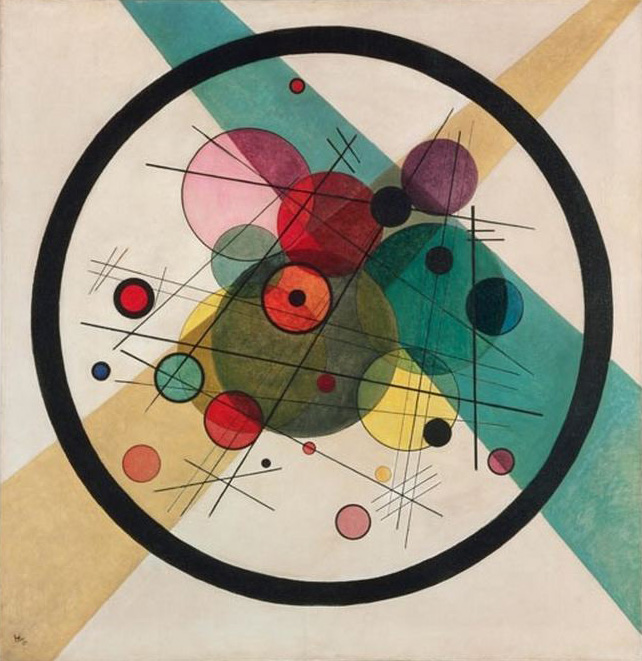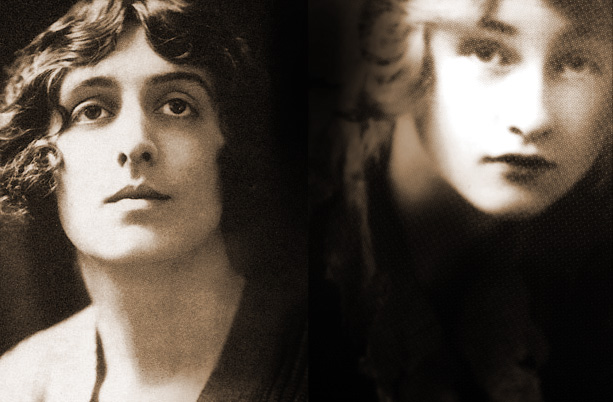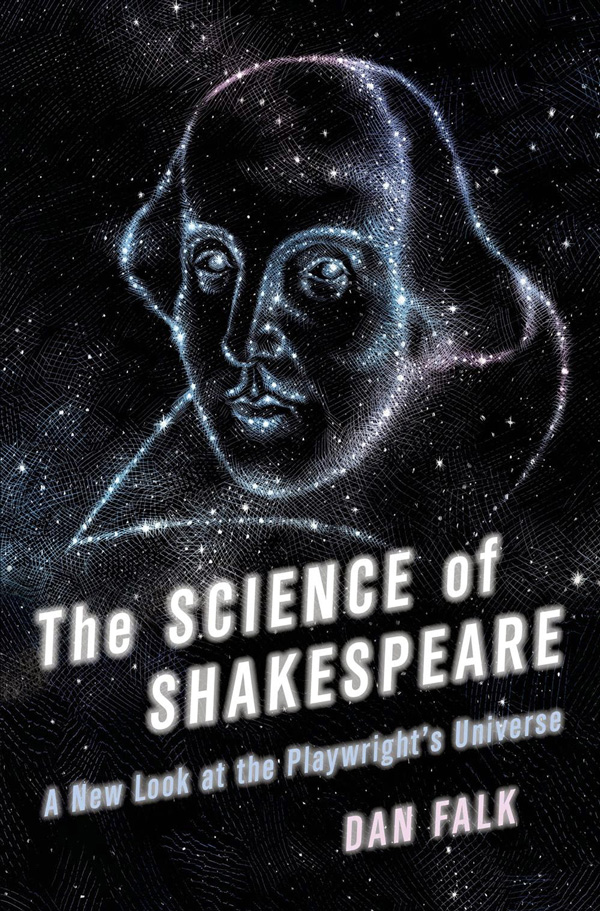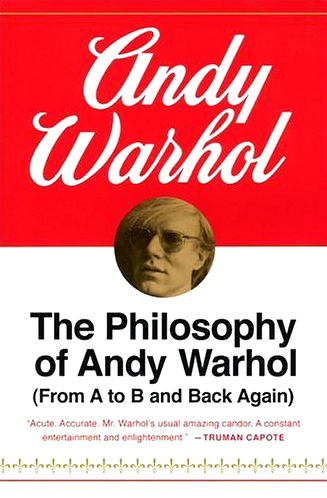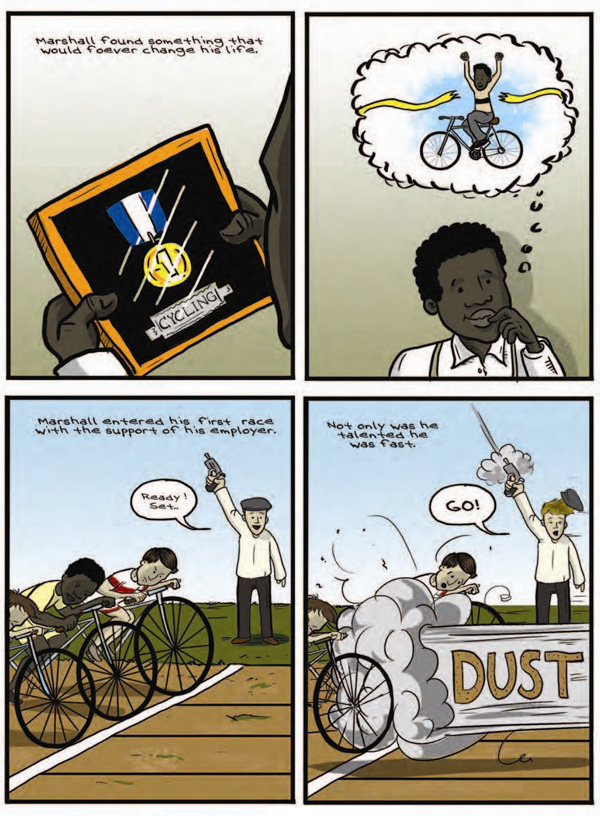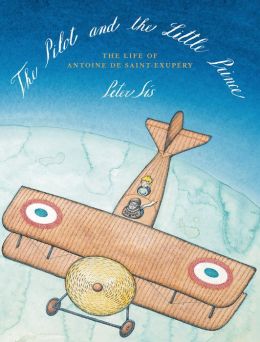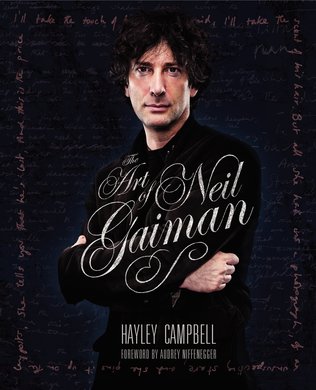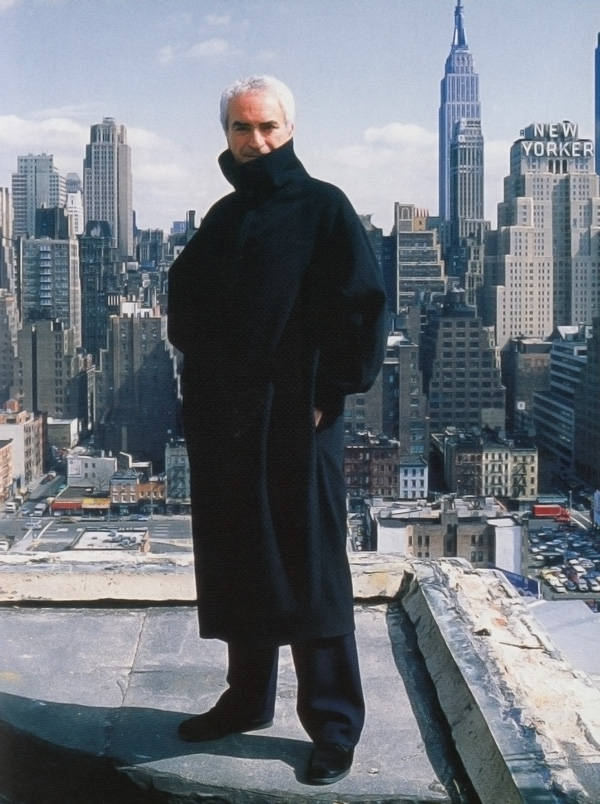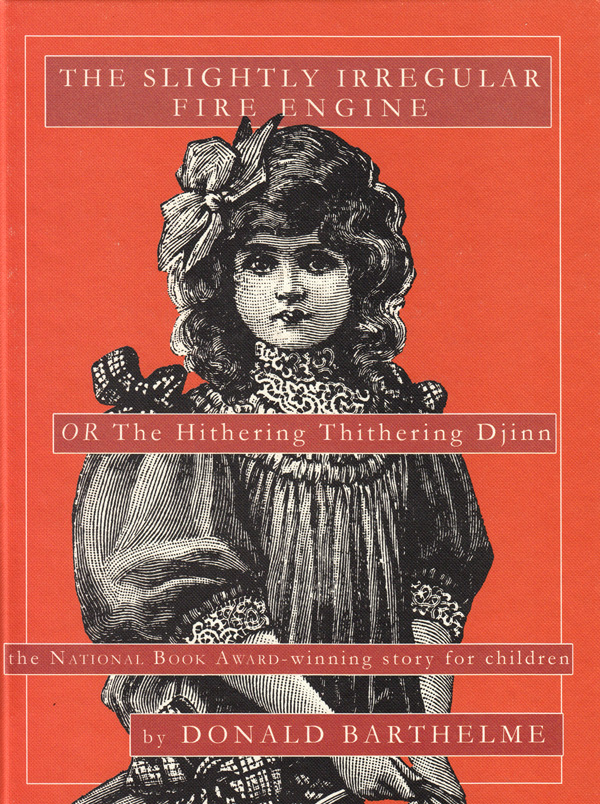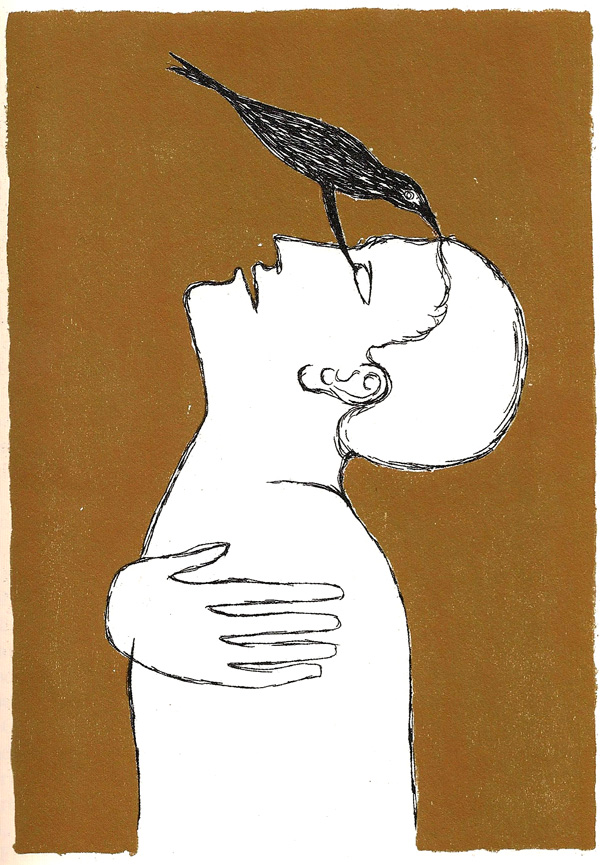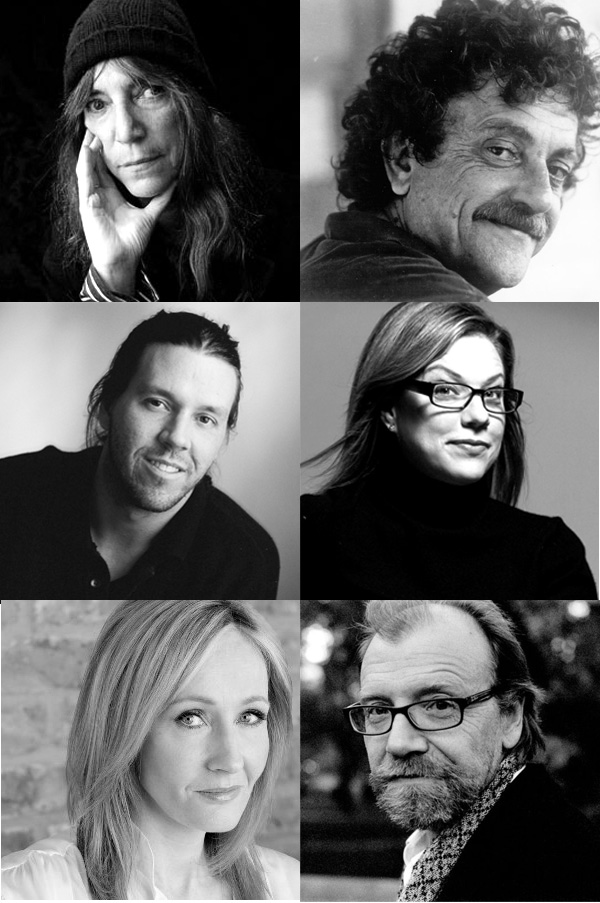 Hey bob sefcik! If you missed last week's edition – Maya Angelou on identity and the meaning of life, Alan Watts on money vs. wealth, major movements in philosophy as minimalist geometric graphics, Thoreau on the greatest gift of growing old, and more – you can catch up right here. And if you're enjoying this, please consider supporting with a modest donation – every little bit helps, and comes enormously appreciated.
Hey bob sefcik! If you missed last week's edition – Maya Angelou on identity and the meaning of life, Alan Watts on money vs. wealth, major movements in philosophy as minimalist geometric graphics, Thoreau on the greatest gift of growing old, and more – you can catch up right here. And if you're enjoying this, please consider supporting with a modest donation – every little bit helps, and comes enormously appreciated.
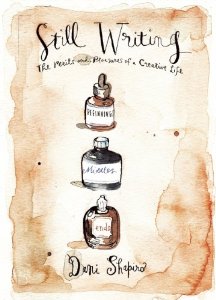 Dani Shapiro is the author of the magnificent memoirs Devotion, Slow Motion: A Memoir of a Life Rescued by Tragedy and, most recently, Still Writing: The Perils and Pleasures of a Creative Life (public library) – one of 2013's best books on writing and creativity. She is also one of the most enchanting nonfiction writers of our time, capable of revealing through the harrowing honesty of the personal the profound resonance of the universal – those deepest yearnings and fears that unite us in our humanity whenever, in a moment of courage or despair, we plunge beneath the surface illusion of our separateness.
Dani Shapiro is the author of the magnificent memoirs Devotion, Slow Motion: A Memoir of a Life Rescued by Tragedy and, most recently, Still Writing: The Perils and Pleasures of a Creative Life (public library) – one of 2013's best books on writing and creativity. She is also one of the most enchanting nonfiction writers of our time, capable of revealing through the harrowing honesty of the personal the profound resonance of the universal – those deepest yearnings and fears that unite us in our humanity whenever, in a moment of courage or despair, we plunge beneath the surface illusion of our separateness.
On an altogether fantastic recent episode of Design Matters, Debbie Millman sits down with Shapiro to talk about writing, vulnerability, spirituality, genesis of creative ideation, and how to live with presence. The wonderfully wide-ranging interview concludes with a double delight – Millman's reading of one of the most beautiful and poignant passages from Still Writing:

 When writers who are just starting out ask me when it gets easier, my answer is never. It never gets easier. I don't want to scare them, so I rarely say more than that, but the truth is that, if anything, it gets harder. The writing life isn't just filled with predictable uncertainties but with the awareness that we are always starting over again. That everything we ever write will be flawed. We may have written one book, or many, but all we know – if we know anything at all – is how to write the book we're writing. All novels are failures. Perfection itself would be a failure. All we can hope is that we will fail better. That we won't succumb to fear of the unknown. That we will not fall prey to the easy enchantments of repeating what may have worked in the past. I try to remember that the job – as well as the plight, and the unexpected joy – of the artist is to embrace uncertainty, to be sharpened and honed by it. To be birthed by it. Each time we come to the end of a piece of work, we have failed as we have leapt – spectacularly, brazenly – into the unknown.
When writers who are just starting out ask me when it gets easier, my answer is never. It never gets easier. I don't want to scare them, so I rarely say more than that, but the truth is that, if anything, it gets harder. The writing life isn't just filled with predictable uncertainties but with the awareness that we are always starting over again. That everything we ever write will be flawed. We may have written one book, or many, but all we know – if we know anything at all – is how to write the book we're writing. All novels are failures. Perfection itself would be a failure. All we can hope is that we will fail better. That we won't succumb to fear of the unknown. That we will not fall prey to the easy enchantments of repeating what may have worked in the past. I try to remember that the job – as well as the plight, and the unexpected joy – of the artist is to embrace uncertainty, to be sharpened and honed by it. To be birthed by it. Each time we come to the end of a piece of work, we have failed as we have leapt – spectacularly, brazenly – into the unknown.
The full conversation is simply spectacular – hear it below, with transcribed highlights:
On the singular demands of the memoir genre and autobiographical nonfiction:
 When you bring out a memoir, the feeling is of the life being reviewed – not the book being reviewed.
When you bring out a memoir, the feeling is of the life being reviewed – not the book being reviewed.
Ultimately, my memoirs are crafted – there's much that I didn't write about… To me, memoir and essay and the kind of nonfiction writing that I've done … is the act of crafting a story – it's actually tremendously controlled. It's the act of exerting my own shape on what is otherwise chaotic… I've chosen exactly what to reveal, and how to reveal it, and I've recognized the story in my life. It's not all interesting … and it's not, [as] I say to my students, "the kitchen-sink approach to memoir" – just because it happened, does not make it compelling and does not make it a story.
On the lengths to which we go to craft our own stories and control our image in the eyes of others – especially as social media sharing is continuing to "turn up the volume on what it means to live out loud":
 Is there anything less revealing of Self than a selfie?
Is there anything less revealing of Self than a selfie?
On the unexpected outpour of humanity in the letters of readers from all walks of life, in response to her spiritual memoir, Devotion:
 Deep inside, we are all so much the same – our details might be different, but we are all kind of walking the same internal path. And when I allow myself to be vulnerable, I am allowing myself to connect. I'm allowing people to connect to me.
Deep inside, we are all so much the same – our details might be different, but we are all kind of walking the same internal path. And when I allow myself to be vulnerable, I am allowing myself to connect. I'm allowing people to connect to me.
On why Abraham Joshua Heschel's idea of time as a cathedral was so influential in Shapiro's journey of writing and living Devotion:
 I loved that so much when I came across it – I felt like it was speaking so completely to what that existential crisis was for me, which was, "How do we live in the moment?" How do we actually be right here, right now – not leaning toward the future, not leaning backwards into the past – and how difficult it is… How do we find a way to inhabit the moment more often than not. How many times have we had the experience of driving a car down the road and suddenly realizing, "Twenty minutes have gone by and I've arrived at my destination, and I have no idea how I got here or what just happened…"
I loved that so much when I came across it – I felt like it was speaking so completely to what that existential crisis was for me, which was, "How do we live in the moment?" How do we actually be right here, right now – not leaning toward the future, not leaning backwards into the past – and how difficult it is… How do we find a way to inhabit the moment more often than not. How many times have we had the experience of driving a car down the road and suddenly realizing, "Twenty minutes have gone by and I've arrived at my destination, and I have no idea how I got here or what just happened…"
That was so powerful to me, that feeling. I wanted to freeze time – freeze the moment that I was in as I was in it, which is the opposite of being in the moment and sort of just staying there. That felt to me like a real spiritual pursuit – to try to understand that and think about that, and in a meditation practice, how to be aware of when my mind was wandering and simply shepherding it back.
On Shapiro's belief that "traces that live within us often lead us to our stories," something Joan Didion called "a shimmer around the edges" – a concept that speaks to the "slow churn" of creativity and the notion that our ideas are the combinatorial product of our experience:
 It's the feeling of something becoming heightened in just a moment where … I know that it's going into a place where it's like it's storing itself somewhere inside of me… It is unmistakable when it happens. And then sometimes… it requires a lot of patience to make sense of it. It's not like that shimmer happens and, Eureka!, you have a story – it's like that shimmer happens and, sometimes, it can be years before it connects to something else that then makes the story clearer, or makes clear why it shimmered.
It's the feeling of something becoming heightened in just a moment where … I know that it's going into a place where it's like it's storing itself somewhere inside of me… It is unmistakable when it happens. And then sometimes… it requires a lot of patience to make sense of it. It's not like that shimmer happens and, Eureka!, you have a story – it's like that shimmer happens and, sometimes, it can be years before it connects to something else that then makes the story clearer, or makes clear why it shimmered.
The full interview is enormously stimulating and soul-stretching, as are Shapiro's books. Sample Still Writing here and here.
:: MORE / SHARE ::

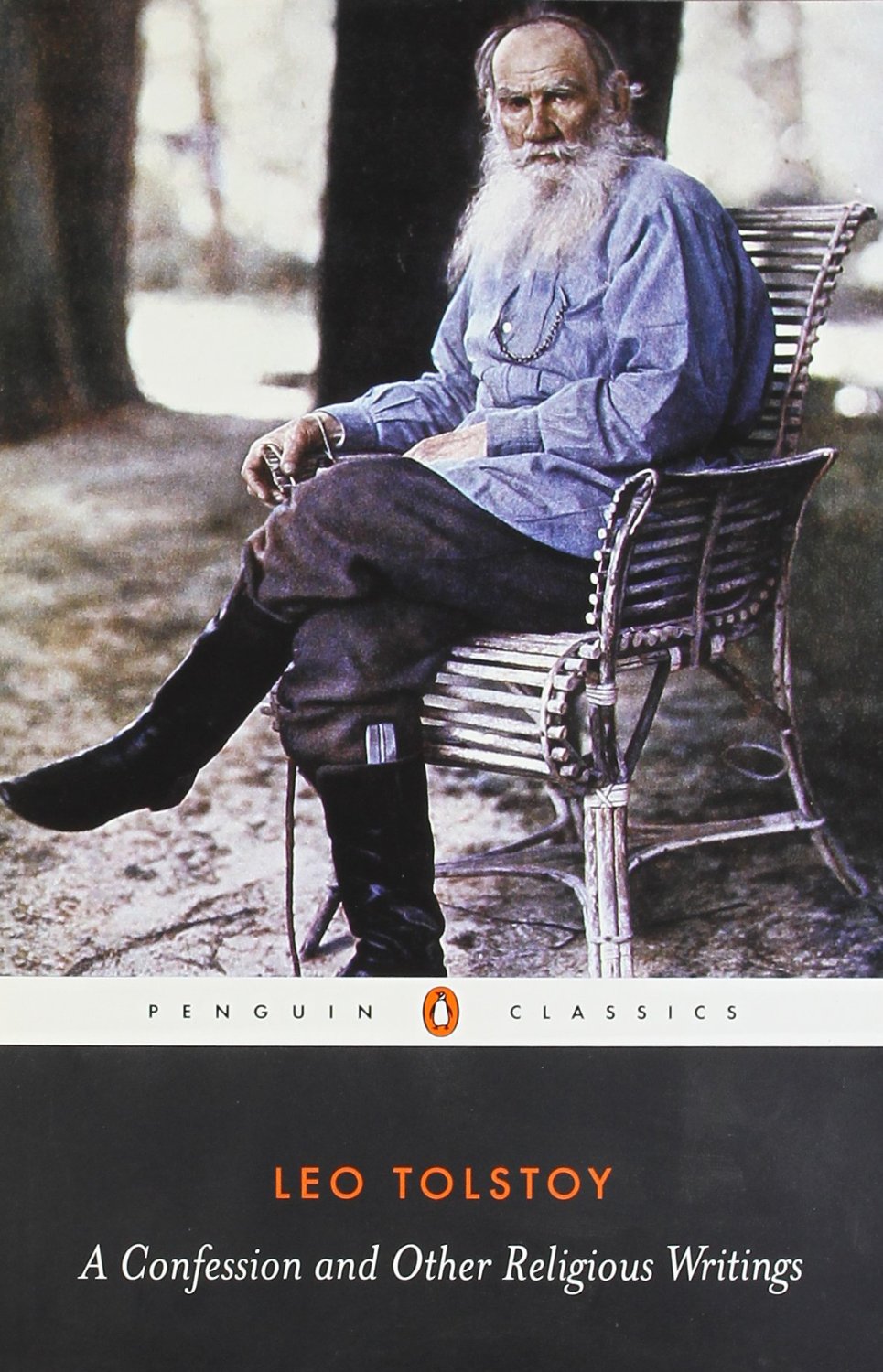 Shortly after turning fifty, Leo Tolstoy succumbed to a profound spiritual crisis. With his greatest works behind him, he found his sense of purpose dwindling as his celebrity and public acclaim billowed, sinking into a state of deep depression and melancholia despite having a large estate, good health for his age, a wife who had born him fourteen children, and the promise of eternal literary fame. On the brink of suicide, he made one last grasp at light amidst the darkness of his existence, turning to the world's great religious and philosophical traditions for answers to the age-old question regarding the meaning of life. In 1879, a decade after War and Peace and two years after Anna Karenina, and a decade before he set out to synthesize these philosophical findings in his Calendar of Wisdom, Tolstoy channeled the existential catastrophe of his inner life in A Confession (public library) – an autobiographical memoir of extraordinary candor and emotional intensity, which also gave us Tolstoy's prescient meditation on money, fame, and writing for the wrong reasons.
Shortly after turning fifty, Leo Tolstoy succumbed to a profound spiritual crisis. With his greatest works behind him, he found his sense of purpose dwindling as his celebrity and public acclaim billowed, sinking into a state of deep depression and melancholia despite having a large estate, good health for his age, a wife who had born him fourteen children, and the promise of eternal literary fame. On the brink of suicide, he made one last grasp at light amidst the darkness of his existence, turning to the world's great religious and philosophical traditions for answers to the age-old question regarding the meaning of life. In 1879, a decade after War and Peace and two years after Anna Karenina, and a decade before he set out to synthesize these philosophical findings in his Calendar of Wisdom, Tolstoy channeled the existential catastrophe of his inner life in A Confession (public library) – an autobiographical memoir of extraordinary candor and emotional intensity, which also gave us Tolstoy's prescient meditation on money, fame, and writing for the wrong reasons.
He likens the progression of his depression to a serious physical illness – a parallel modern science is rending increasingly appropriate. Tolstoy writes:
 Then occurred what happens to everyone sickening with a mortal internal disease. At first trivial signs of indisposition appear to which the sick man pays no attention; then these signs reappear more and more often and merge into one uninterrupted period of suffering. The suffering increases, and before the sick man can look round, what he took for a mere indisposition has already become more important to him than anything else in the world – it is death!
Then occurred what happens to everyone sickening with a mortal internal disease. At first trivial signs of indisposition appear to which the sick man pays no attention; then these signs reappear more and more often and merge into one uninterrupted period of suffering. The suffering increases, and before the sick man can look round, what he took for a mere indisposition has already become more important to him than anything else in the world – it is death!
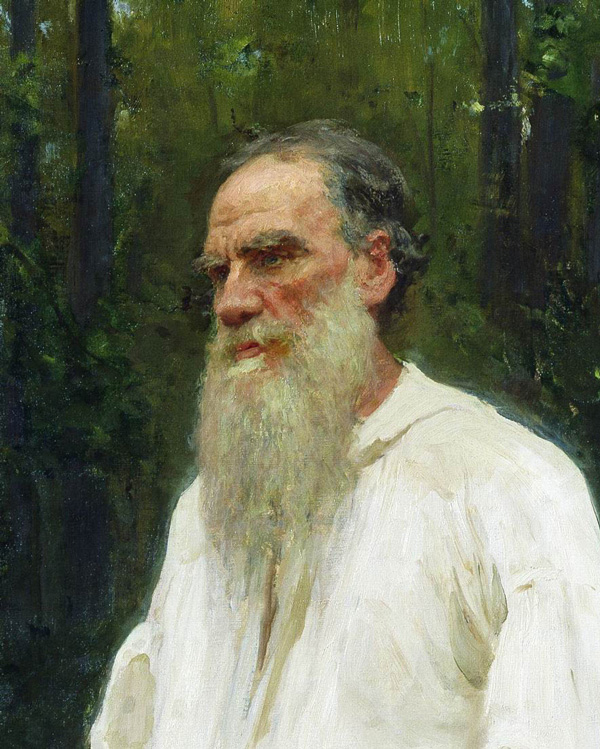
The classic symptoms of anhedonia engulfed him – he lost passion for his work and came to dismiss as meaningless the eternal fame he had once dreamt of. He even ceased to go out shooting with his gun in fear that he might be too tempted to take his own life. Though he didn't acknowledge a "someone" in the sense of a creator, he came to feel that his life was a joke that someone had played on him – a joke all the grimmer for the awareness of our inescapable impermanence, and all the more despairing:
 Today or tomorrow sickness and death will come (they had come already) to those I love or to me; nothing will remain but stench and worms. Sooner or later my affairs, whatever they may be, will be forgotten, and I shall not exist. Then why go on making any effort? . . . How can man fail to see this? And how go on living? That is what is surprising! One can only live while one is intoxicated with life; as soon as one is sober it is impossible not to see that it is all a mere fraud and a stupid fraud! That is precisely what it is: there is nothing either amusing or witty about it, it is simply cruel and stupid.
Today or tomorrow sickness and death will come (they had come already) to those I love or to me; nothing will remain but stench and worms. Sooner or later my affairs, whatever they may be, will be forgotten, and I shall not exist. Then why go on making any effort? . . . How can man fail to see this? And how go on living? That is what is surprising! One can only live while one is intoxicated with life; as soon as one is sober it is impossible not to see that it is all a mere fraud and a stupid fraud! That is precisely what it is: there is nothing either amusing or witty about it, it is simply cruel and stupid.
[…]
Had I simply understood that life had no meaning I could have borne it quietly, knowing that that was my lot. But I could not satisfy myself with that. Had I been like a man living in a wood from which he knows there is no exit, I could have lived; but I was like one lost in a wood who, horrified at having lost his way, rushes about wishing to find the road. He knows that each step he takes confuses him more and more, but still he cannot help rushing about. It was indeed terrible. And to rid myself of the terror I wished to kill myself.
And yet he recognized that the inquiry at the heart of his spiritual malady was neither unique nor complicated:
 My question … was the simplest of questions, lying in the soul of every man from the foolish child to the wisest elder: it was a question without an answer to which one cannot live, as I had found by experience. It was: "What will come of what I am doing today or shall do tomorrow? What will come of my whole life?" Differently expressed, the question is: "Why should I live, why wish for anything, or do anything?" It can also be expressed thus: "Is there any meaning in my life that the inevitable death awaiting me does not destroy?"
My question … was the simplest of questions, lying in the soul of every man from the foolish child to the wisest elder: it was a question without an answer to which one cannot live, as I had found by experience. It was: "What will come of what I am doing today or shall do tomorrow? What will come of my whole life?" Differently expressed, the question is: "Why should I live, why wish for anything, or do anything?" It can also be expressed thus: "Is there any meaning in my life that the inevitable death awaiting me does not destroy?"
Seeking to answer this seemingly simple yet paralyzingly profound question, Tolstoy first turned to science, but found that rather than recognizing and answering the question, science circumvented it and instead asked its own questions, then answered those. Most of all, he found it incapable of illuminating the infinite and instead reducing its questions and answers to finite. He writes:
 These are all words with no meaning, for in the infinite there is neither complex nor simple, neither forward nor backward, nor better or worse… One who sincerely inquires how he is to live cannot be satisfied with the reply – "Study in endless space the mutations, infinite in time and in complexity, of innumerable atoms, and then you will understand your life" – so also a sincere man cannot be satisfied with the reply: "Study the whole life of humanity of which we cannot know either the beginning or the end, of which we do not even know a small part, and then you will understand your own life."
These are all words with no meaning, for in the infinite there is neither complex nor simple, neither forward nor backward, nor better or worse… One who sincerely inquires how he is to live cannot be satisfied with the reply – "Study in endless space the mutations, infinite in time and in complexity, of innumerable atoms, and then you will understand your life" – so also a sincere man cannot be satisfied with the reply: "Study the whole life of humanity of which we cannot know either the beginning or the end, of which we do not even know a small part, and then you will understand your own life."
A century and a half before Alan Lightman tussled, elegantly, with the same paradox, Tolstoy captured the Catch-22 of the predicament:
 The problem of experimental science is the sequence of cause and effect in material phenomena. It is only necessary for experimental science to introduce the question of a final cause for it to become nonsensical. The problem of abstract science is the recognition of the primordial essence of life. It is only necessary to introduce the investigation of consequential phenomena (such as social and historical phenomena) and it also becomes nonsensical. Experimental science only then gives positive knowledge and displays the greatness of the human mind when it does not introduce into its investigations the question of an ultimate cause. And, on the contrary, abstract science is only then science and displays the greatness of the human mind when it puts quite aside questions relating to the consequential causes of phenomena and regards man solely in relation to an ultimate cause.
The problem of experimental science is the sequence of cause and effect in material phenomena. It is only necessary for experimental science to introduce the question of a final cause for it to become nonsensical. The problem of abstract science is the recognition of the primordial essence of life. It is only necessary to introduce the investigation of consequential phenomena (such as social and historical phenomena) and it also becomes nonsensical. Experimental science only then gives positive knowledge and displays the greatness of the human mind when it does not introduce into its investigations the question of an ultimate cause. And, on the contrary, abstract science is only then science and displays the greatness of the human mind when it puts quite aside questions relating to the consequential causes of phenomena and regards man solely in relation to an ultimate cause.
He then turned to philosophy, but found himself equally disillusioned:
 Philosophy not merely does not reply, but is itself only asking that question. And if it is real philosophy all its labour lies merely in trying to put that question clearly.
Philosophy not merely does not reply, but is itself only asking that question. And if it is real philosophy all its labour lies merely in trying to put that question clearly.
Instead of an answer, he finds in philosophy "the same question, only in a complex form." He bemoans the inability of either science or philosophy to offer a real answer:
 One kind of knowledge did not reply to life's question, the other kind replied directly confirming my despair, indicating not that the result at which I had arrived was the fruit of error or of a diseased state of my mind, but on the contrary that I had thought correctly, and that my thoughts coincided with the conclusions of the most powerful of human minds.
One kind of knowledge did not reply to life's question, the other kind replied directly confirming my despair, indicating not that the result at which I had arrived was the fruit of error or of a diseased state of my mind, but on the contrary that I had thought correctly, and that my thoughts coincided with the conclusions of the most powerful of human minds.
Frustrated, Tolstoy answers his own question:
 "Why does everything exist that exists, and why do I exist?" "Because it exists."
"Why does everything exist that exists, and why do I exist?" "Because it exists."
It's a sentiment that John Cage would second a century later ("No why. Just here.") and George Lucas would also echo ("There is no why. We are. Life is beyond reason.") – a proposition that comes closest to the spiritual tradition of Buddhism. And, indeed, Tolstoy turns to spirituality in one final and desperate attempt at an answer – first by surveying how those in his social circle lived with this all-consuming inquiry. He found among them four strategies for managing the existential despair, but none that resolved it:
 I found that for people of my circle there were four ways out of the terrible position in which we are all placed. The first was that of ignorance. It consists in not knowing, not understanding, that life is an evil and an absurdity. From [people of this sort] I had nothing to learn – one cannot cease to know what one does know.
I found that for people of my circle there were four ways out of the terrible position in which we are all placed. The first was that of ignorance. It consists in not knowing, not understanding, that life is an evil and an absurdity. From [people of this sort] I had nothing to learn – one cannot cease to know what one does know.
The second way out is epicureanism. It consists, while knowing the hopelessness of life, in making use meanwhile of the advantages one has, disregarding the dragon and the mice, and licking the honey in the best way, especially if there is much of it within reach… That is the way in which the majority of people of our circle make life possible for themselves. Their circumstances furnish them with more of welfare than of hardship, and their moral dullness makes it possible for them to forget that the advantage of their position is accidental … and that the accident that has today made me a Solomon may tomorrow make me a Solomon's slave. The dullness of these people's imagination enables them to forget the things that gave Buddha no peace – the inevitability of sickness, old age, and death, which today or tomorrow will destroy all these pleasures.
The third escape is that of strength and energy. It consists in destroying life, when one has understood that it is an evil and an absurdity. A few exceptionally strong and consistent people act so. Having understood the stupidity of the joke that has been played on them, and having understood that it is better to be dead than to be alive, and that it is best of all not to exist, they act accordingly and promptly end this stupid joke, since there are means: a rope round one's neck, water, a knife to stick into one's heart, or the trains on the railways; and the number of those of our circle who act in this way becomes greater and greater, and for the most part they act so at the best time of their life, when the strength of their mind is in full bloom and few habits degrading to the mind have as yet been acquired…
The fourth way out is that of weakness. It consists in seeing the truth of the situation and yet clinging to life, knowing in advance that nothing can come of it. People of this kind know that death is better than life, but not having the strength to act rationally – to end the deception quickly and kill themselves – they seem to wait for something. This is the escape of weakness, for if I know what is best and it is within my power, why not yield to what is best? … The fourth way was to live like Solomon and Schopenhauer – knowing that life is a stupid joke played upon us, and still to go on living, washing oneself, dressing, dining, talking, and even writing books. This was to me repulsive and tormenting, but I remained in that position.
Finding himself in the fourth category, Tolstoy beings to question why he hadn't killed himself. Suddenly, he realizes that a part of him was questioning the very validity of his depressive thoughts, presenting "a vague doubt" as to the certainty of his conclusions about the senselessness of life. Humbled by the awareness that the mind is both puppet and puppet-master, he writes:
 It was like this: I, my reason, have acknowledged that life is senseless. If there is nothing higher than reason (and there is not: nothing can prove that there is), then reason is the creator of life for me. If reason did not exist there would be for me no life. How can reason deny life when it is the creator of life? Or to put it the other way: were there no life, my reason would not exist; therefore reason is life's son. Life is all. Reason is its fruit yet reason rejects life itself! I felt that there was something wrong here.
It was like this: I, my reason, have acknowledged that life is senseless. If there is nothing higher than reason (and there is not: nothing can prove that there is), then reason is the creator of life for me. If reason did not exist there would be for me no life. How can reason deny life when it is the creator of life? Or to put it the other way: were there no life, my reason would not exist; therefore reason is life's son. Life is all. Reason is its fruit yet reason rejects life itself! I felt that there was something wrong here.
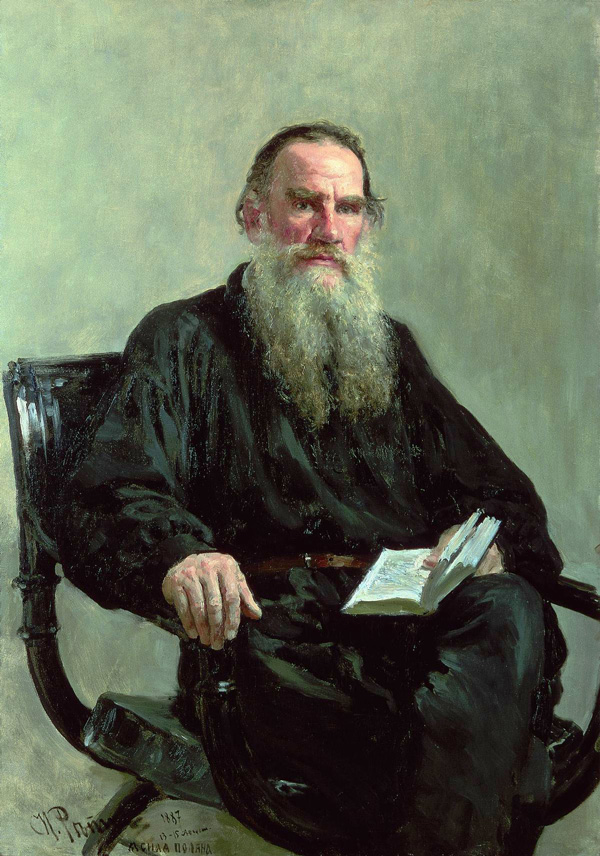
And he discovers the solution not in science or philosophy or the life of hedonism, but in those living life in its simplest and purest form:
 The reasoning showing the vanity of life is not so difficult, and has long been familiar to the very simplest folk; yet they have lived and still live. How is it they all live and never think of doubting the reasonableness of life?
The reasoning showing the vanity of life is not so difficult, and has long been familiar to the very simplest folk; yet they have lived and still live. How is it they all live and never think of doubting the reasonableness of life?
My knowledge, confirmed by the wisdom of the sages, has shown me that everything on earth – organic and inorganic – is all most cleverly arranged – only my own position is stupid. And those fools – the enormous masses of people – know nothing about how everything organic and inorganic in the world is arranged; but they live, and it seems to them that their life is very wisely arranged! . . .
And it struck me: "But what if there is something I do not yet know? Ignorance behaves just in that way. Ignorance always says just what I am saying. When it does not know something, it says that what it does not know is stupid. Indeed, it appears that there is a whole humanity that lived and lives as if it understood the meaning of its life, for without understanding it could not live; but I say that all this life is senseless and that I cannot live.
Awake to what Stuart Firestein would call "thoroughly conscious ignorance" some 130 years later, Tolstoy sees his own blinders with new eyes:
 In the delusion of my pride of intellect it seemed to me so indubitable that I and Solomon and Schopenhauer had stated the question so truly and exactly that nothing else was possible – so indubitable did it seem that all those milliards consisted of men who had not yet arrived at an apprehension of all the profundity of the question – that I sought for the meaning of my life without it once occurring to me to ask: "But what meaning is and has been given to their lives by all the milliards of common folk who live and have lived in the world?"
In the delusion of my pride of intellect it seemed to me so indubitable that I and Solomon and Schopenhauer had stated the question so truly and exactly that nothing else was possible – so indubitable did it seem that all those milliards consisted of men who had not yet arrived at an apprehension of all the profundity of the question – that I sought for the meaning of my life without it once occurring to me to ask: "But what meaning is and has been given to their lives by all the milliards of common folk who live and have lived in the world?"
I long lived in this state of lunacy, which, in fact if not in words, is particularly characteristic of us very liberal and learned people. But thanks either to the strange physical affection I have for the real laboring people, which compelled me to understand them and to see that they are not so stupid as we suppose, or thanks to the sincerity of my conviction that I could know nothing beyond the fact that the best I could do was to hang myself, at any rate I instinctively felt that if I wished to live and understand the meaning of life, I must seek this meaning not among those who have lost it and wish to kill themselves, but among those milliards of the past and the present who make life and who support the burden of their own lives and of ours also. And I considered the enormous masses of those simple, unlearned, and poor people who have lived and are living and I saw something quite different. I saw that, with rare exceptions, all those milliards who have lived and are living do not fit into my divisions, and that I could not class them as not understanding the question, for they themselves state it and reply to it with extraordinary clearness. Nor could I consider them epicureans, for their life consists more of privations and sufferings than of enjoyments. Still less could I consider them as irrationally dragging on a meaningless existence, for every act of their life, as well as death itself, is explained by them. To kill themselves they consider the greatest evil. It appeared that all mankind had a knowledge, unacknowledged and despised by me, of the meaning of life. It appeared that reasonable knowledge does not give the meaning of life, but excludes life: while the meaning attributed to life by milliards of people, by all humanity, rests on some despised pseudo-knowledge.
He considers the necessary irrationality of faith and contemplates its unfair ask of forsaking reason:
 Rational knowledge presented by the learned and wise, denies the meaning of life, but the enormous masses of men, the whole of mankind receive that meaning in irrational knowledge. And that irrational knowledge is faith, that very thing which I could not but reject. It is God, One in Three; the creation in six days; the devils and angels, and all the rest that I cannot accept as long as I retain my reason. My position was terrible. I knew I could find nothing along the path of reasonable knowledge except a denial of life; and there – in faith – was nothing but a denial of reason, which was yet more impossible for me than a denial of life. From rational knowledge it appeared that life is an evil, people know this and it is in their power to end life; yet they lived and still live, and I myself live, though I have long known that life is senseless and an evil. By faith it appears that in order to understand the meaning of life I must renounce my reason, the very thing for which alone a meaning is required… A contradiction arose from which there were two exits. Either that which I called reason was not so rational as I supposed, or that which seemed to me irrational was not so irrational as I supposed.
Rational knowledge presented by the learned and wise, denies the meaning of life, but the enormous masses of men, the whole of mankind receive that meaning in irrational knowledge. And that irrational knowledge is faith, that very thing which I could not but reject. It is God, One in Three; the creation in six days; the devils and angels, and all the rest that I cannot accept as long as I retain my reason. My position was terrible. I knew I could find nothing along the path of reasonable knowledge except a denial of life; and there – in faith – was nothing but a denial of reason, which was yet more impossible for me than a denial of life. From rational knowledge it appeared that life is an evil, people know this and it is in their power to end life; yet they lived and still live, and I myself live, though I have long known that life is senseless and an evil. By faith it appears that in order to understand the meaning of life I must renounce my reason, the very thing for which alone a meaning is required… A contradiction arose from which there were two exits. Either that which I called reason was not so rational as I supposed, or that which seemed to me irrational was not so irrational as I supposed.
And therein he finds the error in all of his prior reasoning, the root of his melancholia about life's meaninglessness:
 Verifying the line of argument of rational knowledge I found it quite correct. The conclusion that life is nothing was inevitable; but I noticed a mistake. The mistake lay in this, that my reasoning was not in accord with the question I had put. The question was: "Why should I live, that is to say, what real, permanent result will come out of my illusory transitory life – what meaning has my finite existence in this infinite world?" And to reply to that question I had studied life.
Verifying the line of argument of rational knowledge I found it quite correct. The conclusion that life is nothing was inevitable; but I noticed a mistake. The mistake lay in this, that my reasoning was not in accord with the question I had put. The question was: "Why should I live, that is to say, what real, permanent result will come out of my illusory transitory life – what meaning has my finite existence in this infinite world?" And to reply to that question I had studied life.
The solution of all the possible questions of life could evidently not satisfy me, for my question, simple as it at first appeared, included a demand for an explanation of the finite in terms of the infinite, and vice versa. I asked: "What is the meaning of my life, beyond time, cause, and space?" And I replied to quite another question: "What is the meaning of my life within time, cause, and space?" With the result that, after long efforts of thought, the answer I reached was: "None." In my reasonings I constantly compared (nor could I do otherwise) the finite with the finite, and the infinite with the infinite; but for that reason I reached the inevitable result: force is force, matter is matter, will is will, the infinite is the infinite, nothing is nothing – and that was all that could result.
[…]
Philosophic knowledge denies nothing, but only replies that the question cannot be solved by it – that for it the solution remains indefinite. Having understood this, I understood that it was not possible to seek in rational knowledge for a reply to my question, and that the reply given by rational knowledge is a mere indication that a reply can only be obtained by a different statement of the question and only when the relation of the finite to the infinite is included in the question. And I understood that, however irrational and distorted might be the replies given by faith, they have this advantage, that they introduce into every answer a relation between the finite and the infinite, without which there can be no solution.
So that besides rational knowledge, which had seemed to me the only knowledge, I was inevitably brought to acknowledge that all live humanity has another irrational knowledge – faith which makes it possible to live. Faith still remained to me as irrational as it was before, but I could not but admit that it alone gives mankind a reply to the questions of life, and that consequently it makes life possible.
Tolstoy notes that, whatever the faith may be, it "gives to the finite existence of man an infinite meaning, a meaning not destroyed by sufferings, deprivations, or death," and yet he is careful not to conflate faith with a specific religion. Like Flannery O'Connor, who so beautifully differentiated between religion and faith, Tolstoy writes:
 I understood that faith is not merely "the evidence of things not seen", etc., and is not a revelation (that defines only one of the indications of faith, is not the relation of man to God (one has first to define faith and then God, and not define faith through God); it is not only agreement with what has been told one (as faith is most usually supposed to be), but faith is a knowledge of the meaning of human life in consequence of which man does not destroy himself but lives. Faith is the strength of life. If a man lives he believes in something. If he did not believe that one must live for something, he would not live. If he does not see and recognize the illusory nature of the finite, he believes in the finite; if he understands the illusory nature of the finite, he must believe in the infinite. Without faith he cannot live…
I understood that faith is not merely "the evidence of things not seen", etc., and is not a revelation (that defines only one of the indications of faith, is not the relation of man to God (one has first to define faith and then God, and not define faith through God); it is not only agreement with what has been told one (as faith is most usually supposed to be), but faith is a knowledge of the meaning of human life in consequence of which man does not destroy himself but lives. Faith is the strength of life. If a man lives he believes in something. If he did not believe that one must live for something, he would not live. If he does not see and recognize the illusory nature of the finite, he believes in the finite; if he understands the illusory nature of the finite, he must believe in the infinite. Without faith he cannot live…
For man to be able to live he must either not see the infinite, or have such an explanation of the meaning of life as will connect the finite with the infinite.
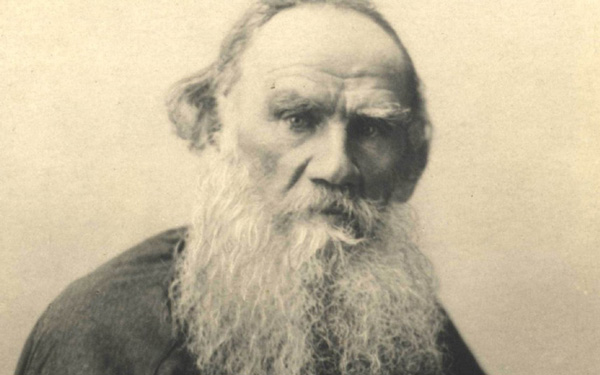
And yet the closer he examines faith, the more glaring he finds the disconnect between it and religion, particularly the teachings of the Christian church and the practices of the wealthy. Once again, he returns to the peasants as a paragon of spiritual salvation, of bridging the finite with the infinite, and once again seeing in their ways an ethos most closely resembling the Buddhist philosophy of acceptance:
 In contrast with what I had seen in our circle, where the whole of life is passed in idleness, amusement, and dissatisfaction, I saw that the whole life of these people was passed in heavy labour, and that they were content with life. In contradistinction to the way in which people of our circle oppose fate and complain of it on account of deprivations and sufferings, these people accepted illness and sorrow without any perplexity or opposition, and with a quiet and firm conviction that all is good. In contradistinction to us, who the wiser we are the less we understand the meaning of life, and see some evil irony in the fact that we suffer and die, these folk live and suffer, and they approach death and suffering with tranquility and in most cases gladly…
In contrast with what I had seen in our circle, where the whole of life is passed in idleness, amusement, and dissatisfaction, I saw that the whole life of these people was passed in heavy labour, and that they were content with life. In contradistinction to the way in which people of our circle oppose fate and complain of it on account of deprivations and sufferings, these people accepted illness and sorrow without any perplexity or opposition, and with a quiet and firm conviction that all is good. In contradistinction to us, who the wiser we are the less we understand the meaning of life, and see some evil irony in the fact that we suffer and die, these folk live and suffer, and they approach death and suffering with tranquility and in most cases gladly…
In complete contrast to my ignorance, [they] knew the meaning of life and death, labored quietly, endured deprivations and sufferings, and lived and died seeing therein not vanity but good…
[…]
I understood that if I wish to understand life and its meaning, I must not live the life of a parasite, but must live a real life, and – taking the meaning given to live by real humanity and merging myself in that life – verify it.
A Confession is a remarkable read in its entirety. Complement it with Tolstoy's subsequent opus of philosophical inquiry, A Calendar of Wisdom, and this rare recording of him reading from the latter, exploring the object of life shortly before his death.
Also see more meditations on the meaning of life from Carl Sagan, Maya Angelou, Richard Feynman, David Foster Wallace, John Steinbeck, Anaïs Nin, George Lucas, and Viktor Frankl.
:: MORE / SHARE ::

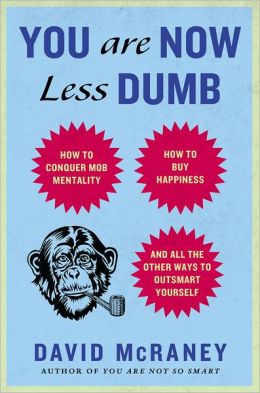 "Optimism is the faith that leads to achievement; nothing can be done without hope," Helen Keller wrote in her 1903 treatise on optimism. But a positive outlook, it turns out, isn't merely an intellectual disposition we don – it's a deep-seated component of our evolutionary wiring and the product of powerful, necessary delusions our mind is working around-the-clock to maintain. At the root of that mental machinery lies what psychologists have termed the self-enhancement bias – our systematic tendency to forgo rational evaluation of our own merits and abilities in favor of unrealistic attitudes that keep our ego properly inflated as to avoid sinking into the depths of despair.
"Optimism is the faith that leads to achievement; nothing can be done without hope," Helen Keller wrote in her 1903 treatise on optimism. But a positive outlook, it turns out, isn't merely an intellectual disposition we don – it's a deep-seated component of our evolutionary wiring and the product of powerful, necessary delusions our mind is working around-the-clock to maintain. At the root of that mental machinery lies what psychologists have termed the self-enhancement bias – our systematic tendency to forgo rational evaluation of our own merits and abilities in favor of unrealistic attitudes that keep our ego properly inflated as to avoid sinking into the depths of despair.
The self-enhancement bias, which has significant overlap with the optimism bias neuroscientist Tali Sharot has studied, is one of the seventeen psychological phenomena David McRaney explores in You Are Now Less Dumb: How to Conquer Mob Mentality, How to Buy Happiness, and All the Other Ways to Outsmart Yourself (public library), which also illuminated why we have a hard time changing our minds and how Benjamin Franklin handled haters.
The mind's delusory tendencies, McRaney explains, are just as vital as the automatic self-preservation processes of the body. Much like the respiration inhibition function of the brain prevents us from damaging our lungs by consciously deciding to stop breathing, the psyche employs a sort of "despair-inhibition module" of positive illusions constantly running in the background to power our self-enhancement bias – those rose-colored glasses we reserve exclusively for viewing ourselves, without which we might be blinded by life.
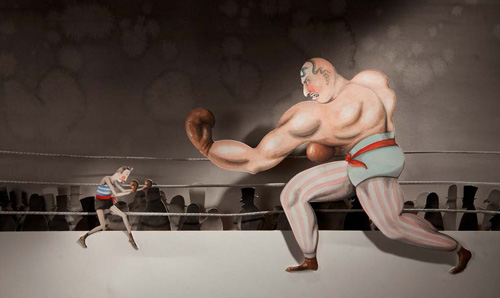
Illustration from The Mightly Lalouche by Sophie Blackall
Citing several studies, McRaney writes:
 Your wildly inaccurate self-evaluations get you through rough times and help motivate you when times are good. [Research shows] that people who are brutally honest with themselves are not as happy day to day as people with unrealistic assumptions about their abilities.
Your wildly inaccurate self-evaluations get you through rough times and help motivate you when times are good. [Research shows] that people who are brutally honest with themselves are not as happy day to day as people with unrealistic assumptions about their abilities.
In other words, not only was Hunter S. Thompson right about journalism when he wrote that "there is no such thing as Objective Journalism" and that "the phrase itself is a pompous contradiction in terms," but he was also right about the human condition at large – we are wildly unrealistic about ourselves, and that's a good thing. Still, our self-perception – or explanatory style – exists on a spectrum, and different people fall at different spots along it. McRaney explains:
 At one end is a black swamp of unrealistic negative opinions about life and your place in it. At the other end is an overexposed candy-cane forest of unrealistic positive opinions about how other people see you and your own competence. Right below the midpoint of this spectrum is a place where people see themselves in a harsh yellow light of objectivity. Positive illusions evaporate there, and the family of perceptions mutating off the self-serving bias cannot take root. About 20 percent of all people live in that spot, and psychologists call the state of mind generated by those people depressive realism*. If your explanatory style rests in that area of the spectrum, you tend to experience a moderate level of depression more often than not because you are cursed to see the world as a place worthy neither of great dread nor of bounding delight, but just a place. You have a strange superpower – the ability to see the world closer to what it really is. Your more accurate representations of social reality make you feel bad and weird mainly because most people have a reality-distortion module implanted in their heads; sadly, yours is either missing or malfunctioning.
At one end is a black swamp of unrealistic negative opinions about life and your place in it. At the other end is an overexposed candy-cane forest of unrealistic positive opinions about how other people see you and your own competence. Right below the midpoint of this spectrum is a place where people see themselves in a harsh yellow light of objectivity. Positive illusions evaporate there, and the family of perceptions mutating off the self-serving bias cannot take root. About 20 percent of all people live in that spot, and psychologists call the state of mind generated by those people depressive realism*. If your explanatory style rests in that area of the spectrum, you tend to experience a moderate level of depression more often than not because you are cursed to see the world as a place worthy neither of great dread nor of bounding delight, but just a place. You have a strange superpower – the ability to see the world closer to what it really is. Your more accurate representations of social reality make you feel bad and weird mainly because most people have a reality-distortion module implanted in their heads; sadly, yours is either missing or malfunctioning.
A subset of three positive illusions powers our self-enhancement bias. One is the illusory superiority bias – our tendency to judge ourselves less harshly than we do others and to see ourselves as unique, special individuals amid a homogenous, dull crowd. Another is the illusion of control – our hindsight's inclination to attribute our successes to ability and our failures to luck. McRaney writes:
 The illusion of control persists like the other positive illusions because you need to feel as though you can push against the world and notice it move. Without that belief, your spirit dwindles quickly…
The illusion of control persists like the other positive illusions because you need to feel as though you can push against the world and notice it move. Without that belief, your spirit dwindles quickly…
(It's worth noting that the workings of this particular cognitive curiosity get significantly warped due to social and cultural biases that render some individual privileged and some discriminated against – over time, the former begin to see their fortunate circumstances as a reflection of their innate ability and merit, and the latter come to see themselves as the cause of their own misfortune, further internalizing the social trauma.)
Another vital positive illusion is the optimism bias:
 Optimism bias [is] mental construct that provides smokers the belief they'll be among those who escape cancer, motorists the confidence they can speed during rainstorms, couples the certainty they will die hand in hand behind a white picket fence, and immigrants the beamish tenacity to open a new business in a down economy. No matter the statistical odds, no matter how many examples to the contrary you've seen in your life, you have a tendency to believe everything will work out in the end, and it is hard to argue with this approach to life when you consider the alternative. The bias, however, disappears when you observe others. You believe your heart will stay strong until you are in your nineties, but that your cousin who buys chicken-fried steaks in bulk is headed for an early grave. The bias also prevents you from buying a fire extinguisher for your kitchen, or going to get a regular checkup. Your optimism bias keeps you looking to the horizon with growing expectation and glee.
Optimism bias [is] mental construct that provides smokers the belief they'll be among those who escape cancer, motorists the confidence they can speed during rainstorms, couples the certainty they will die hand in hand behind a white picket fence, and immigrants the beamish tenacity to open a new business in a down economy. No matter the statistical odds, no matter how many examples to the contrary you've seen in your life, you have a tendency to believe everything will work out in the end, and it is hard to argue with this approach to life when you consider the alternative. The bias, however, disappears when you observe others. You believe your heart will stay strong until you are in your nineties, but that your cousin who buys chicken-fried steaks in bulk is headed for an early grave. The bias also prevents you from buying a fire extinguisher for your kitchen, or going to get a regular checkup. Your optimism bias keeps you looking to the horizon with growing expectation and glee.
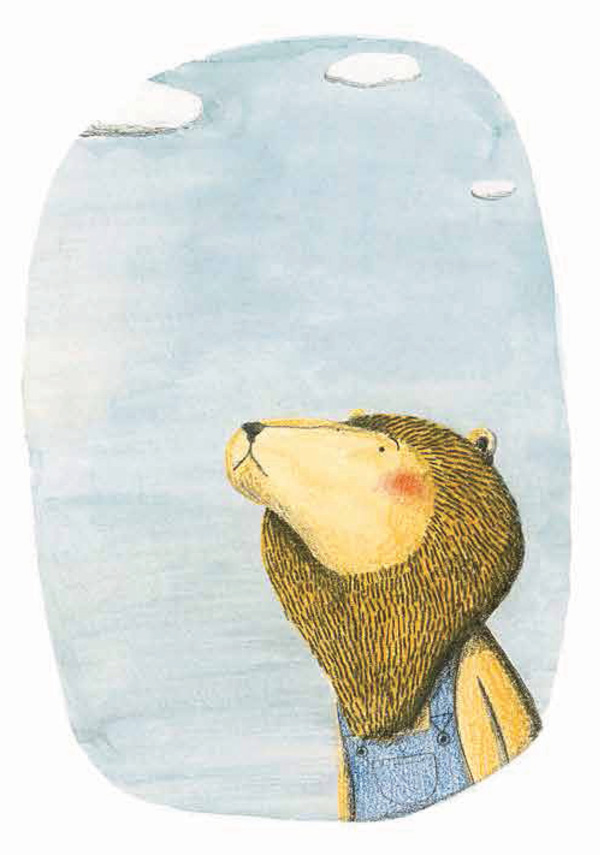
Illustration by from The Lion and the Bird by Marianne Dubuc
Still other illusions underlie the trifecta of our self-illusory positivity – confirmation bias, which leads us to notice more of the information which confirms our beliefs and less of that which contradicts them, hindsight bias, which causes us to retroactively revise our own predictions in the face of new information and claim that we always saw it coming, and self-serving bias, which lets us take credit for all the good stuff that happens to us but blame the bad on external circumstances or other people. McRaney summarizes the formidable alchemy of these conspirers in forming the master-delusion of our self-enhancement bias:
 The positive illusions and their helpers form a supercluster of delusion that thumps in the psyche of every human. Together, illusory superiority bias, the illusion of control, optimism bias, confirmation bias, hindsight bias, and self-serving bias combine like Voltron into a mental chimera called self-enhancement bias. It works just as the name suggests – it enhances your view of your self.
The positive illusions and their helpers form a supercluster of delusion that thumps in the psyche of every human. Together, illusory superiority bias, the illusion of control, optimism bias, confirmation bias, hindsight bias, and self-serving bias combine like Voltron into a mental chimera called self-enhancement bias. It works just as the name suggests – it enhances your view of your self.
To be sure, this isn't just some abstract theory psychologists concocted while twiddling their thumbs. McRaney cites a number of studies that illustrate in nearly comical detail the living manifestation of self-enhancement bias. One of the best was conducted at UCLA in 2010:
 Researchers conducted a survey of more than 25,000 people ages 18–75 and found that the majority rated their own attractiveness as about a seven out of ten. This suggests that the average person thinks he is a little better looking than the average person. About a third of the people under 30 rated themselves as somewhere around a nine… You don't have to be a mathematician to see a major problem here. Every person's assumptions about being above average can't be true. There can't be an average unless some people sit in the middle of a bell curve and others fall to either side. Statistically speaking, if you had a perfect measure of your abilities you would see that you fall into the average category for most things, but you have a very hard time believing this is true.
Researchers conducted a survey of more than 25,000 people ages 18–75 and found that the majority rated their own attractiveness as about a seven out of ten. This suggests that the average person thinks he is a little better looking than the average person. About a third of the people under 30 rated themselves as somewhere around a nine… You don't have to be a mathematician to see a major problem here. Every person's assumptions about being above average can't be true. There can't be an average unless some people sit in the middle of a bell curve and others fall to either side. Statistically speaking, if you had a perfect measure of your abilities you would see that you fall into the average category for most things, but you have a very hard time believing this is true.
So how, in the grand scheme of Earth history, did we end up so gloriously misguided about ourselves? McRaney points to evolutionary biologists, who have suggested that "the overconfident invaders of the jungles and savannah may have been so bold and intimidating that when they charged into the camps of their enemies, they tended to do better than the more timid and shy among them." (The neuropsychology of the winner effect further advances this theory.) Similarly, some psychologists have posited that confidence is the deciding factor in survival:
 There are psychologists who believe that morale is nothing more than a cluster of positive illusions; and morale is generally considered more important in combat than anything else. Confidence in battle and in courtship is certainly an important starting point for understanding where self-enhancement bias came from. These, though, may just be variations on a more fundamental truth. The general speculation is that over the last few million years, the primates who survived long enough to become your grandparents were the ones who didn't give up when all hope was lost.
There are psychologists who believe that morale is nothing more than a cluster of positive illusions; and morale is generally considered more important in combat than anything else. Confidence in battle and in courtship is certainly an important starting point for understanding where self-enhancement bias came from. These, though, may just be variations on a more fundamental truth. The general speculation is that over the last few million years, the primates who survived long enough to become your grandparents were the ones who didn't give up when all hope was lost.
Fast-forward to modernity, and the same tendency toward doggedness and optimism in the face of resistance can be seen in the stories of our most celebrated modern heroes.
McRaney sums up the vital role of our self-enhancement bias:
 You have the capacity to rationally judge the risks and benefits, the costs and rewards, of complex systems, but in a pinch you can fall back on a simple and reliable shortcut: just be slightly and blindly overconfident. The best bluff, it turns out, is the one in which even the bluffer is unaware of the cards he is holding. If you could accurately assess the odds against you—whether those odds took the shape of a hunting expedition, a one-on-one fight, or the job market for philosophy majors – you would probably turn away from the struggle more often than not. There is always plenty of evidence that the odds are not in your favor, enough to deter you from trying just about everything in life. Luckily for you, most of the time you have no idea what you are getting into, and you greatly overestimate your chances for success. It makes sense that primates like you would have evolved a fondness for delusions of grandeur. That's the sort of attitude that gets you out of caves and beds. The relentless bombardment of challenges and tribulations makes it very difficult to be a person, whether you must fend off rabid beavers or ravenous bill collectors. Those who tried just a few percentage points harder, who persevered just a smidge longer, defeated nature more often than the realists. You've inherited a tendency to thrash against the odds, to be optimistic in the face of futility.
You have the capacity to rationally judge the risks and benefits, the costs and rewards, of complex systems, but in a pinch you can fall back on a simple and reliable shortcut: just be slightly and blindly overconfident. The best bluff, it turns out, is the one in which even the bluffer is unaware of the cards he is holding. If you could accurately assess the odds against you—whether those odds took the shape of a hunting expedition, a one-on-one fight, or the job market for philosophy majors – you would probably turn away from the struggle more often than not. There is always plenty of evidence that the odds are not in your favor, enough to deter you from trying just about everything in life. Luckily for you, most of the time you have no idea what you are getting into, and you greatly overestimate your chances for success. It makes sense that primates like you would have evolved a fondness for delusions of grandeur. That's the sort of attitude that gets you out of caves and beds. The relentless bombardment of challenges and tribulations makes it very difficult to be a person, whether you must fend off rabid beavers or ravenous bill collectors. Those who tried just a few percentage points harder, who persevered just a smidge longer, defeated nature more often than the realists. You've inherited a tendency to thrash against the odds, to be optimistic in the face of futility.
For a more mundane manifestation of our positive illusions, McRaney points to social media, where we carefully manicure and manipulate the image of Self we broadcast to others. (After all, Dani Shapiro put it perfectly: "Is there anything less revealing of Self than a selfie?") But despite how off-putting such practices can be, it's perhaps assuring to remember that they spring from an essential evolutionary feature. McRaney's words are ultimately ones of assurance:
 The desire to see yourself as better than average and more competent, skilled, intelligent, and beautiful than you truly are is likely embedded in your psyche as a by-product of millions of years of forging ahead against the same odds of survival that have erased 99 percent of all species that once roamed this planet.
The desire to see yourself as better than average and more competent, skilled, intelligent, and beautiful than you truly are is likely embedded in your psyche as a by-product of millions of years of forging ahead against the same odds of survival that have erased 99 percent of all species that once roamed this planet.
He is careful to point out, however, that nurture aids nature in sculpting our levels of confidence as our early experiences have the power to either enhance or suppress those inherent tendencies. For a glaring example, look no further than the question of women in science, where we've made paltry progress since the days of pioneering astronomer Maria Mitchell and the gender gap in modern science education – in a culture that questions girls' competence in science, is it any wonder that women are far less likely to be confident, let alone overconfident, in such careers?
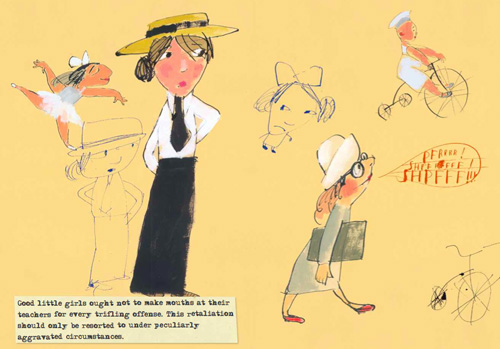
Illustration by Vladimir Radunsky from Advice to Little Girls by Mark Twain
And yet, large-scale social biases and limitations aside, we're extraordinarily good at cultivating the very conditions that would contribute to our own confidence. McRaney points to the work of legendary psychologist B.F. Skinner, who believed that our core personality is shaped by small, everyday "experiments" we conduct in childhood, designed to foster our self-enhancement, by putting ourselves in situations where we are competent and thus grow increasingly confident:
 Over time, [Skinner] believed, you learn that a wide variety of situations and behaviors will get you attention and praise or some other reward, and you begin to position yourself to always be in situations that allow for such an exchange with the outside world. You build a sense of self-confidence around those actions and situations you can be fairly certain will provide you a return or, as he put it, a reinforcer. This is why, he said, you decide to skip some gatherings and attend others. This is why you become fast friends with some people, and others turn you off within seconds. You tend to protect a bubble you've created and nurtured your entire life, a bubble of positive illusions that make you feel good about yourself. Those good feelings bleed into your sense of control and your general attitude when facing unfamiliar problems. Self-esteem and self-efficacy work together to get you out of bed in the morning and keep you going back for more punishment from the unforgiving world.
Over time, [Skinner] believed, you learn that a wide variety of situations and behaviors will get you attention and praise or some other reward, and you begin to position yourself to always be in situations that allow for such an exchange with the outside world. You build a sense of self-confidence around those actions and situations you can be fairly certain will provide you a return or, as he put it, a reinforcer. This is why, he said, you decide to skip some gatherings and attend others. This is why you become fast friends with some people, and others turn you off within seconds. You tend to protect a bubble you've created and nurtured your entire life, a bubble of positive illusions that make you feel good about yourself. Those good feelings bleed into your sense of control and your general attitude when facing unfamiliar problems. Self-esteem and self-efficacy work together to get you out of bed in the morning and keep you going back for more punishment from the unforgiving world.
This model offers the psychological basis for Anna Deavere Smith's poetic definition of self-esteem as "that which gives us a feeling of well-being, a feeling that everything's going to be all right." But perhaps the greatest gift of our self-enhancement bias, McRaney argues, is bestowed upon us precisely when we feel that things are not going to be all right. In a sentiment reminiscent of Viktor Frankl, he concludes beautifully:
 Throughout human history there have been periods in which people bore tremendous burdens and slogged through what seemed like insurmountable misery. From concentration camps to death marches, to plagues and wars, people who share the same basic mind as you have suffered and survived horrific events. Likewise, you share something amazing with those who live daily under the yoke of terrible oppression. Should you be plucked from your cozy place in this world and assume their plight, should your will be tested at the intensity of so many before you, one constant is sure: You will be resilient. You won't give up.
Throughout human history there have been periods in which people bore tremendous burdens and slogged through what seemed like insurmountable misery. From concentration camps to death marches, to plagues and wars, people who share the same basic mind as you have suffered and survived horrific events. Likewise, you share something amazing with those who live daily under the yoke of terrible oppression. Should you be plucked from your cozy place in this world and assume their plight, should your will be tested at the intensity of so many before you, one constant is sure: You will be resilient. You won't give up.
You Are Now Less Dumb is enormously illuminated in its entirety and comes on the heels of You Are Not So Smart, one of the best psychology books of 2011.
* For more on depressive realism, see Jonathan Rottenberg on the evolutionary origins of depression
:: MORE / SHARE ::

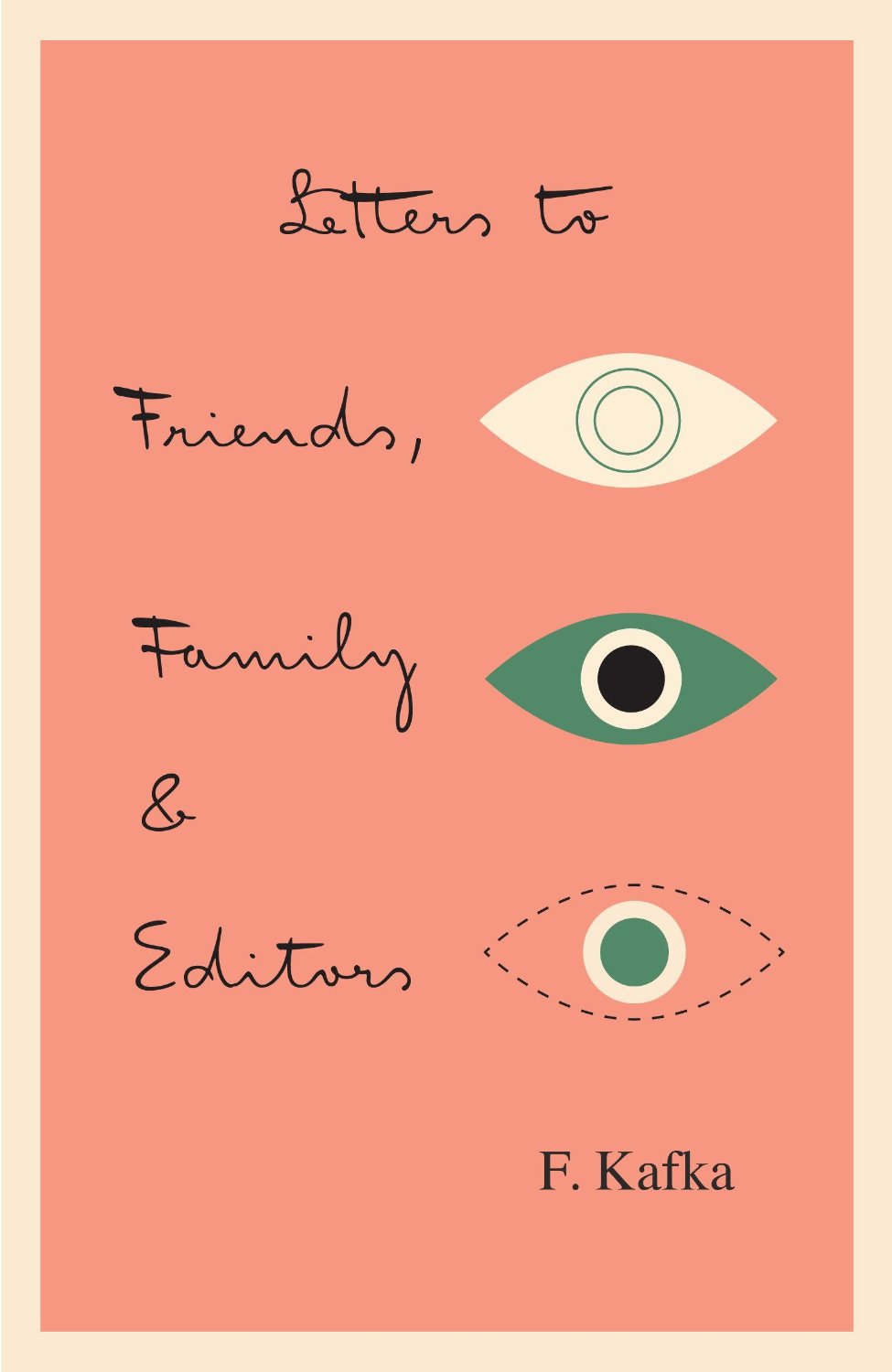 "Reading is the work of the alert mind, is demanding, and under ideal conditions produces finally a sort of ecstasy," E.B. White wrote while contemplating the future of reading in 1951. Indeed, the question of why books matter and what reading does for the human spirit has occupied minds great and little, from Carl Sagan's beautiful meditation in Cosmos to the 9-year-old girl whose question about why we have books I once answered. But perhaps the best articulation of what books do for the soul comes from a mind often painted as dark and depressive, yet capable of extraordinary sensitivity to the beauty of life: Franz Kafka.
"Reading is the work of the alert mind, is demanding, and under ideal conditions produces finally a sort of ecstasy," E.B. White wrote while contemplating the future of reading in 1951. Indeed, the question of why books matter and what reading does for the human spirit has occupied minds great and little, from Carl Sagan's beautiful meditation in Cosmos to the 9-year-old girl whose question about why we have books I once answered. But perhaps the best articulation of what books do for the soul comes from a mind often painted as dark and depressive, yet capable of extraordinary sensitivity to the beauty of life: Franz Kafka.
In a November 1903 letter, found in the altogether enchanting compendium Letters to Friends, Family and Editors (public library), 20-year-old Kafka writes to his childhood friend, the art historian Oskar Pollak:
 Some books seem like a key to unfamiliar rooms in one's own castle.
Some books seem like a key to unfamiliar rooms in one's own castle.
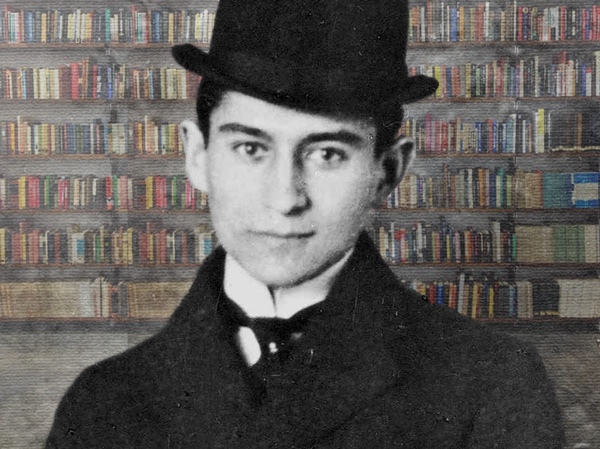
A few months later, in January of 1904, he expounds on this sentiment in another letter to Pollak:
 I think we ought to read only the kind of books that wound and stab us. If the book we're reading doesn't wake us up with a blow on the head, what are we reading it for? So that it will make us happy, as you write? Good Lord, we would be happy precisely if we had no books, and the kind of books that make us happy are the kind we could write ourselves if we had to. But we need the books that affect us like a disaster, that grieve us deeply, like the death of someone we loved more than ourselves, like being banished into forests far from everyone, like a suicide. A book must be the axe for the frozen sea inside us. That is my belief.
I think we ought to read only the kind of books that wound and stab us. If the book we're reading doesn't wake us up with a blow on the head, what are we reading it for? So that it will make us happy, as you write? Good Lord, we would be happy precisely if we had no books, and the kind of books that make us happy are the kind we could write ourselves if we had to. But we need the books that affect us like a disaster, that grieve us deeply, like the death of someone we loved more than ourselves, like being banished into forests far from everyone, like a suicide. A book must be the axe for the frozen sea inside us. That is my belief.
Complement Letters to Friends, Family and Editors with the illustrated gem Kafka for kids, then revisit Maurice Sendak's little-known and lovely posters celebrating books and reading.
:: MORE / SHARE ::
If you enjoyed this, please consider becoming a supporter with a recurring monthly donation here, or a one-time donation in any amount below: 

 Hey bob sefcik! If you missed last week's edition – Maya Angelou on identity and the meaning of life, Alan Watts on money vs. wealth, major movements in philosophy as minimalist geometric graphics, Thoreau on the greatest gift of growing old, and more – you can catch up
Hey bob sefcik! If you missed last week's edition – Maya Angelou on identity and the meaning of life, Alan Watts on money vs. wealth, major movements in philosophy as minimalist geometric graphics, Thoreau on the greatest gift of growing old, and more – you can catch up 













